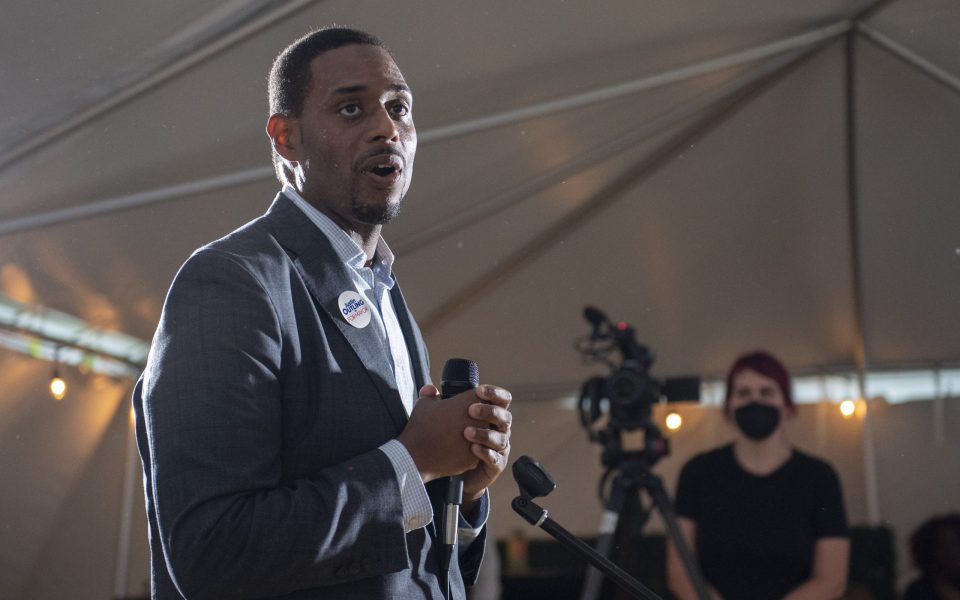Due to the close nature of the Greensboro mayoral race, runner-up Justin Outling has not yet conceded to unofficial winner Nancy Vaughan who garnered 43 percent or 13,932 votes compared to Outling’s 41.7 percent or 13,507 votes.
In a statement on Wednesday, Outling’s campaign manager Chelsea Boccardo told TCB that the campaign is waiting for the outstanding mail-in and provisional ballots to be counted.
“One thing is clear from the results,” the statement reads. “Greensboro wants change, beyond the status quo…. Considering there are an unknown number of mail-in votes (absentee and service members) collected through Friday, and a margin of 1.3 percent between the top mayoral candidates, we are patiently waiting for more information from the Board of Elections.”
In order for him to be declared the winner, Outling would have to gain 426 of those votes still left to be counted and would have to win with more than a 1 percent margin between him and Vaughan.
By Tuesday night, Outling had won 180 mail-in ballots compared to Vaughan’s 263. These ballots were ones that had been turned in early and counted before Election Day.

As of Wednesday morning, Guilford County Board of Elections Director Charlie Collicutt told Triad City Beat that so far, the board has counted an additional 34 provisional ballots and 17 absentee ballots and they will continue to receive ballots through Friday. As long as the ballots are postmarked with the July 26 Election Day date and are received by the elections office by this Friday, they are eligible to be counted.
Despite Outling’s hold out for hope, the numbers don’t look to be in his favor.
According to Collicutt, “typically what you see in these ballots, is that they tend to break the same way that the election did, that’s just statistically. That does not necessarily mean that’s the case here, we don’t know. I think though, if a lot of ballots come in, don’t assume they’re for one candidate or the other.”
For example, in the 2017 municipal election, there were less than 500 total mail-in ballots cast in the at-large race which was the most popular race. That included numbers from before Election Day and after.
“I don’t think history shows that you’re going to add another 500,” Collicutt said. “I’m going to see what we got in 2017 after Election Day…I don’t know how many it was. I don’t think it was too many…”
In another close race between fourth place at-large candidate Katie Rossabi and third-place unofficial winner Hugh Holston, Collicutt noted that even though it looks like there is a less than 1 percent difference between the two, in actuality, there is a more than 2 percent difference when just their votes are isolated.
Based on results from Tuesday night, Holston got 11,925 votes to Rossabi’s 11,371 votes. Combined, that’s a total of 23,296. That means that Holston won 51.18 percent of those votes compared to Rossabi’s 48.81 percent. That’s a 2.37 percent difference, which is how differences are calculated based on the state statute, Collicutt said.

As for the rest of the mail-in and provisional ballots, Collicutt said that they would continue to count all votes they receive through Friday and that the election board will meet several times next week to go over the results. Final, official results we be out by the end of next week.
To read the full write-up of results from Election Day in both the mayoral race and the city council races, read our reporting here and here.
Join the First Amendment Society, a membership that goes directly to funding TCB‘s newsroom.
We believe that reporting can save the world.
The TCB First Amendment Society recognizes the vital role of a free, unfettered press with a bundling of local experiences designed to build community, and unique engagements with our newsroom that will help you understand, and shape, local journalism’s critical role in uplifting the people in our cities.
All revenue goes directly into the newsroom as reporters’ salaries and freelance commissions.


Leave a Reply